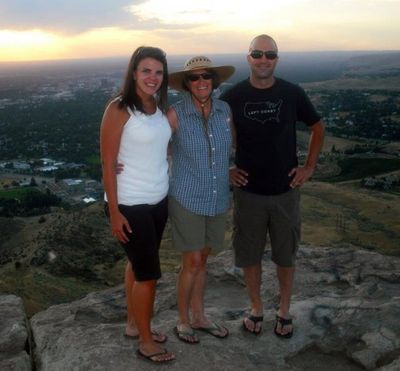Author channels grief through storytelling

It was the middle of July and for the past month I had cleaned, painted and made minor repairs on a rental house my parents own across the street from my home. For two weeks, the temperatures were in the high 90’s to over 100 degrees.
I was hot, sweaty, breathing bathroom chemical fumes and digging out mildewed caulking in a shower stall when I thought, “So, this is what happens when your honey-do done gone. You’re responsible for it all.”
Every life, every marriage, has themes that are interwoven throughout the years that are shared. A recurring theme for my husband Dennis and me was, “not to let adversity define your life.”
Adversity definitely leaves its imprint on the lives it affects. To let the source of adversity become the primary focus of living, allows it to win and we become victims, losing a part of our spirit.
We didn’t let it define us or become our primary focus of living. Eventually – in time, he left this world and our two children and I were left behind to grieve deeply and then try to find our way back to living.
If you’re reading this, you most likely are traveling a similar sojourn or know someone who is.
Dennis was diagnosed with his first brain tumor in 1976 at the age of 26. At first, the neurosurgeon believed it to be a simple meningioma, that when surgically removed is gone for good.
Although a scary episode in our lives, Dennis healed completely and we moved forward with living.
We moved to a new state, established careers, got married, bought our first home and had our first child. Life was normal and similar to every other young family. We were thankful for that sense of well-being.
But the tumor’s origin didn’t disappear. In 1984, the second brain tumor was diagnosed and for the next 17 years there were more recurrences than I can remember. The tumor form was finally diagnosed as a hemangioplastic pericytoma.
Its origin is in the bloodstream, which allows tumors to metastasize throughout the body, though in his situation usually only one or two at a time would occur.
Dennis eventually underwent four brain and two abdominal surgeries, a liver transplant, and numerous rounds of radiation for the smaller tumors. In a way, he was lucky because this form of tumor is responsive to radiation and Dennis tolerated the treatments with minimal side effects.
Many times he rode his bicycle to and from the tumor institute for his treatments. These actions became another way to symbolize that living with his cancer was not going to define his life.
The attitude that Dennis and I came to adopt was one of acceptance. These medical episodes became one more thing to do during the day, though there were times when they did occupy entire days or weeks. Our acceptance did not instantly appear.
In the early years, there were plenty of questions of “Why me?” Dennis questioned whether he was getting some type of karmic payback.
Once the disbelief wore off, the anger came, especially when medical complications arose. I remember one occasion doing some good foot stomping in a San Francisco park, and railing at God for allowing the latest complications to happen.
Meanwhile our 2-year-old son scrambled joyfully over the park’s play equipment. Dennis was doing his own railing from a hospital bed. Our faith was on its own life support system.
Over the next couple of years, our faith strengthened and became deeper. We started to attend a small church near our home and developed friendships within the congregation of believers.
The pastor and other members embraced our family and offered many prayers for healing through the years. Dennis and I explored and challenged our beliefs about God and our relationship with the Divine. Wrestling with our questions about the purpose of these medical episodes caused a transformation of our thinking and life outlook.
Instead of asking, “Why me?” and feeling victimized by God, we learned to view these life challenges from the perspective of “What am I supposed to learn from this, God?” This change in perspective afforded us to live our lives with more grace and peace. We gave thanks to God for each day we had together, and we learned many lessons about ourselves, how we related to the world, and what was truly important in our life.
In 2001, Dennis’ condition began to deteriorate. Though he continued to remain hopeful that he could outlive these tumor recurrences and receive treatments, he also began to say his goodbyes and tie up loose ends.
One advantage in coming to terms with a terminal illness, as opposed to sudden death, is the allowance of time to say what is in one’s heart, so when death arrives, not much is left unsaid. There can be reconciliation and peace.
Dennis was a fortunate man as he lived his life with little regret. Most of his conversations in his last year were about shared memories and stories laced with love and laughter and some wisdom. I know these encounters may have left our family and friends with sadness when we went our separate ways, but they were integral to the life journey. Everyone needed the chance to say goodbye.
On Jan. 24, 2002 Dennis died, as did the world we knew.